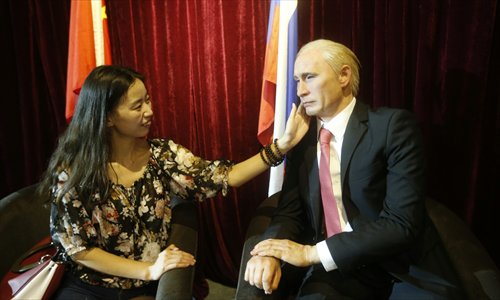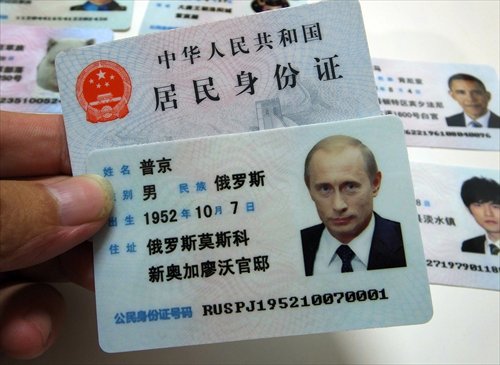HOME >> CHINA
China's Putin fever
Source:Global Times Published: 2014-7-2 21:23:01
Why does the Russian president have a legion of Chinese fans?

A visitor views a wax figure of Russian president Vladimir Putin in the Olympic Regatta Museum in Qingdao, Shandong Province, on July 1. Photo: CFP
A week before Russian president Vladimir Putin came to China for a visit in May, the Chinese version of the collected works of Putin was officially published.
It's rare for collected works of a foreign leader to be published in China, according to the Phoenix Weekly. When China and the Soviet Union had close relations the collected works of Lenin and Stalin were published, but ever since then, no other Soviet Union or Russian leaders has published books in China.
The book has 43 speeches by Putin in 2012 from different occasions, including talks at universities, interviews with the media and speeches at commemoration events. Putin spoke on a variety of subjects, including ethnic issues, international cooperation and the establishment of a just society in Russia.
Chinese Foreign Minister Wang Yi wrote in the foreword that "China and Russia have entered a new development stage in the comprehensive strategic partnership," and he thinks that as the relationship develops, the Chinese public will show more and more interest in Russia.
The publication of the book shows the acceptance of Putin by the Chinese government and public, but it is only one of the signs of Putin's popularity in China.
Putin's fans
Putin has never written an autobiography, but there are more than 60 types of books in which he is the central focus, according to the Phoenix Weekly.
"They treat political leaders as they treat entertainment idols, they chase Putin because they are attracted by the strong 'emperor' quality from him," Qi Fei, a Phoenix Weekly reporter, said while describing the "Putin fans" she has met personally.
Even in Hong Kong and Taiwan, the "Putin fever" has taken hold.
Online posts presenting many of Putin's personal photos, including pictures of him playing hockey, riding a motorcycle, driving F1 racecars, or diving, circulate on the Web. Many received the comment "There's nothing Putin can't do."
Many of the fans are women, many well-educated and fluent in English. Qi said when she visited Russia, two women who were studying in Moscow came to her and asked whether she can help take close-up photos of Putin. They knew about Putin's busy schedule and knew he usually doesn't rest well in these trips.
After Crimea declared it will join Russia, Putin's domestic support rate increased to 75.7 percent, according to polls published by the Russian Public Opinion Research Center, the highest in five years. However, it's nothing when compared with the support rate from online polls in China.
In March, Tencent published an online commentary entitled "Do the Chinese love Putin the most?" At the end, there was a poll asking whether people supported Putin. Again, he won 92 percent support from Chinese respondents online.
Tencent doesn't stand alone in its research results. In the comments of an article Why Do Chinese People Like Putin Better Than Russians? written by researcher Fang Liang, the most seconded comment is one that praises Putin, according to the Phoenix Weekly.
The fans who treat Putin merely as an idol and pass around his photos are merely a small percentage. Most of the Putin fans don't pursue himself, but rather "a leader with character," or a hardliner who "strikes back when the country's sovereignty and territorial integrity is invaded," according to the comments. Their fondness for Putin is rooted in something deeper.

A street vendor shows a fake Chinese ID card of Putin for sale in Guangzhou, Guangdong Province, on June 27, 2013. Photo: IC
Grass is greener
The comments are made mostly because people are disappointed with Chinese politics and praise the way which Putin deals with certain issues. The Chinese public has begun to see Putin as someone who brought Russia out of a mud puddle and to prosperity.
On August 8, 2008, the day the Beijing Olympics opened, the Russian army drove into neighboring Georgia and accelerated the local conflict into a lightning-fast war. Even though Russia's actions left the Chinese government in an awkward situation, public opinion took the Russian side, according to the Phoenix Weekly.
The reason why the Russian army started the war, which was "to protect citizens in the country," excited people in China. Putin's image became a defender of national sovereignty, who isn't afraid of going to war.
Some people wrote on an online forum at people.com.cn that as China is now engaged in peaceful development, its diplomatic route has been deemed as weak by many Chinese, especially in rows concerning territorial disputes. This contrasts with the country's hardline diplomacy stance before the opening up and reform policy.
"Chinese people approve of Putin for the same reasons that they reminisce about Chairman Mao," another online post said.
Another of Putin's achievements applauded by the Chinese people has been his anti-corruption campaign. In recent years, Russia established the official property declaration system, a system that has been discussed in China but never set up.
This is despite the fact that, according to research by Transparency International, Russia has consistently been placed behind China, India and Vietnam for more than 10 years in terms of corruption.
The fever for Putin is often associated with hatred for Japan, so much so that the friendly gestures between the two countries can be interpreted in a different way.
During the Sochi Winter Olympics, because Russia previously had laws restricting gay rights, Russia was boycotted by Western countries. At this time, the visit from Japan was a good sign, and Putin meeting Abe with a dog given to him by the Akita city government in Japan was also a sign of friendship and peace.
However, the Chinese netizens jokingly took it to mean that Putin greeted Abe in a condescending way, according to the Phoenix Weekly, because the word "dog" in Chinese means both the animal and is an insult.
The netizens even took it so far as reading Putin petting the dog and saying it "sometimes bites" as intentional insults for Abe.
It's also interesting that Putin is portrayed like a savior in Chinese tales. In such stories, Putin says to land tycoons in Russia, "Do you want to stay in prison or do you want to bring the land prices down?" and succeeds in bringing down the price by 60 percent in a year.
Rooted in politics
A commentary on fechina.com said that the high support rate and Putin's popularity is because Chinese media have presented a "perfect Putin." While the photos of Putin putting on political shows can be found everywhere on Chinese media, there were hardly any negative reports on Putin.
Furthermore, many of the charismatic things Putin has done, that would be familiar to Chinese audiences, didn't actually happen, according to the commentary.
There's a popular article that summarizes Putin's "principles for being a man," which includes quotes like "If you aren't ready for war, then don't pick up a weapon," or "Our land is vast indeed, but there is not an inch to spare."
However, these quotes are made-up, according to fechina.com. On the one hand, such representations of Putin show the fondness of the Chinese netizens toward his hardline image, but on the other hand, they show there are nationalistic sentiments that need to be released.
The commentary said that in China's reform process, problems such as the gap between the rich and poor emerged, and there are quite a few people who have been reminiscing about the past. There is also resentment toward the West to some degree. Putin's image catered to both of these feelings.
When analyzing Putin's popularity, some claim China is a country with thousands of years of feudal history, so ordinary people are just too used to a leader of authority, and a powerful Putin fits this requirement.
Many online posts on Baidu compare Putin with Barack Obama. The democratic liberal image of Obama has a tough time when framed next to Putin's popularity, and the most of the results favor Putin.
Researcher Fang Liang wrote in his article Why do Chinese People Like Putin Better Than Russians? that the drawbacks of Putin's system are starting to show in Russia, and that in Russia, Putin's image is already dimming, but that process hasn't come to China yet.
"Putin's biggest failure is leading Russia to a path that only relied on oil and gas," he wrote. "Russia now lags behind in many modern industrial products and this can be blamed on strategic short-sightedness in the former Soviet Union era."
In Western media, Putin is often referred to as a modern czar who stifles dissent, curtails civil rights and relentlessly crushes his rivals.
However, these views in the West are often overlooked by the Chinese, as people still worship Putin's hardline policies domestically and his stance against the West.
There are still bitter memories that the West once bullied China after the Opium War, and these continued since the founding of the People's Republic of China in 1949, therefore those who are able to cause trouble for the West easily find favor with Chinese people, said Wang Yuanfeng, a professor from Beijing Jiaotong University.
Attitudes toward Putin are also regarded as a litmus test for Chinese people's political predispositions. While Putin is viewed as a demigod by a lot of netizens, criticism echoing the Western barrage can also be found on liberal online forums and websites.
Phoenix Weekly - Agencies
Posted in: In-Depth